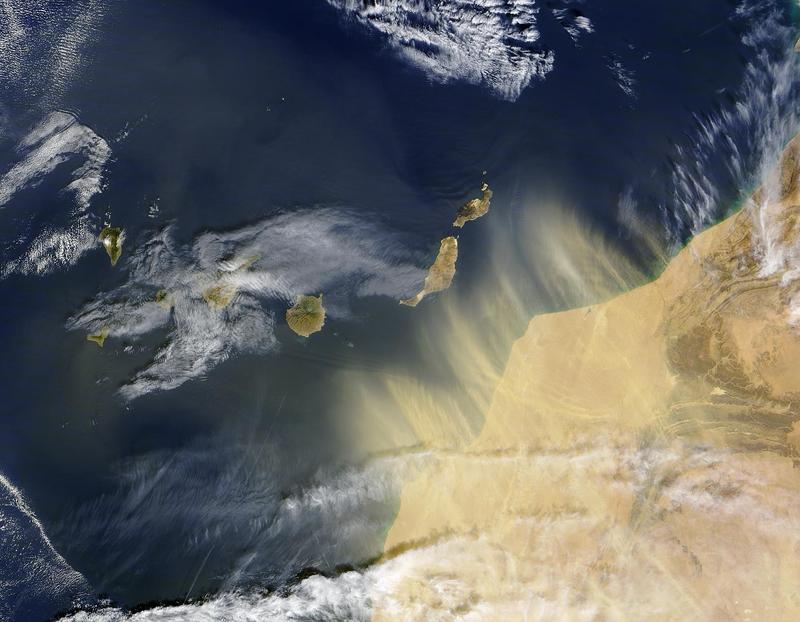

Desert dust from North Africa also flown the Atlantic Ocean to the Canary Islands. Observed by MODIS on NASA's Terra satellite on February 17 of 2004.
Source: NASA
Mineral dust is an important player in the climate system, but its spatio-temporal variability is not fully understood. This project makes complementary use of satellite data and numerical modelling for characterizing the atmospheric dust cycle.
As an interpretation interface between models and satellite retrievals, Meteosat dust index images will be calculated from model data and analysed. To improve the representation of the dust cycle in models and thus the understanding of controls on its variability, dust emission schemes will be revisited and improved with emphasis on anthropogenic and alluvial dust sources in the frame of the proposed project.
The new working group consists of four positions, a scientific leader, two PhD students and one PostDoc. The group is led by Dr. Kerstin Schepanski, who studied Meteorology at the University in Kiel, where she also did her PhD. She continued her research as a Postdoctoral research fellow at the School of Earth and Environment at the University of Leeds, UK, for several years and is now working at TROPOS since 2013. Focus of her work is on the complex interplay of mineral dust and the atmosphere.
In spring 2014, the scientist organised the first “Leipziger Staubtag” linking scientists working on mineral dust with background in different research disciplines. Dr. Kerstin Schepanski participated in 2013/2014 in the Leibniz Mentoring Program, which offers a one-year mentoring program for highly-qualified women post-docs to support them on the path to leadership positions and professorships. The Leibniz Mentoring Program organised by the Leibniz Association is one of the strategic tools for promoting equal opportunities.
End of 2014, the Senate Competition Committee (Senatsausschuss Wettbewerb, SAW) has granted 28 research projects, one of them the project “Dust at the interface – modelling and remote sensing” at TROPOS. The Leibniz Competition (formerly SAW Procedure) is a competitive tool for allocating research funding within the Leibniz Association.
Leibniz institutions compete directly with one another, submitting a maximum of one application per year for a project und one of the five funding lines which are: innovative projects, national and international networking, promotion of junior researchers, promoting women for academic leadership positions, transfer of results and promotion of staff start-ups. These funding lines are based on the objectives of the Joint Initiative for Research and Innovation.
Leipzig occupies a prominent position worldwide in the research on aerosol, clouds and their impact on the Earth’s climate system. Already in 2006 in Morocco and in 2008 in Cape Verde, scientists from Leipzig, together with German and international partners, carried out large field campaigns to study these processes.
The DFG research group SAMUM (Saharan Mineral Dust Experiment), which was initiated and coordinated by TROPOS, carried out one of the largest field experiments of this kind in the world and yielded to a number of other successful collaborations. Dust is also the focus of the Leipzig Graduate School “Aerosols, Clouds, Radiation: Mineral dust”, a joint doctoral program of the Leibniz Institute for Tropospheric Research and the University of Leipzig.
Tilo Arnhold
Contact:
Dr. Kerstin Schepanski
Leibniz Institute for Tropospheric Research (TROPOS)
phone +49-341-2717-7195
http://www.tropos.de/institut/abteilungen/modellierung-atmosphaerischer-prozesse…
or
Tilo Arnhold, TROPOS Public Relations
phone +49-341-2717-7060
http://www.tropos.de/en/current-issues/press-releases/
Links:
Leibniz Competition
http://www.leibniz-gemeinschaft.de/en/about-us/leibniz-competition/
Modelling Saharan dust transport
http://www.tropos.de/en/institute/departments/modeling-of-atmospheric-processes/…
The Leipzig Graduate School on “Clouds, Aerosols and Radiation: Mineral Dust”
http://www.lgs-car.tropos.de/eng/index.html
The Leibniz Institute of Tropospheric Research (TROPOS) is member of the Leibniz Society which consists of 89 independent research institutes. Research at these institutes ranges from natural-, engineering- and environmental research to economy, regional and social research to the humanities. Leibniz institutes work on questions relevant to society, economy and ecology. The institutes focus on knowledge- and application-oriented basic research. They operate scientific infrastructure and offer research-based service. The Leibniz society puts focus on knowledge transfer toward policy, science, economy, and the public sector. Leibniz institutes are in intensive cooperation with universities – including the ScienceCampi -, with industry and other partners in Germany and abroad. The institutes undergo high-quality, independent and transparent evaluations. Because of their importance for Germany, the Federal Government and the federal states fund the Leibniz-Society together. The Leibniz-Institutes employ around 17.200 staff, among them are 8.200 scientists. The total annual budget of the institutes is 1.5 Billion Euro.
http://www.leibniz-gemeinschaft.de/en/home/
http://www.tropos.de/en/current-issues/press-releases/details/leibniz-strengthen…












